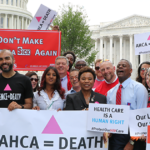Federal Updates
Health care
We beat the ACA repeal. What’s next?
Seven years of ongoing efforts led by Republicans in Congress to repeal the Affordable Care Act (ACA), strip vital protections for people with HIV and other pre-existing conditions, and dismantle Medicaid came to a dramatic end on the Senate floor in the early hours of the morning Friday, July 28. Following the House passage of Zombie Trumpcare in May, Senate Republicans had been secretly working to draft and cobble votes together for their chamber’s version of an ACA repeal bill. Here is a brief overview and timeline of the three versions of ACA repeal legislation Senate Republicans tried to pass.- On Tuesday, July 25: the first Senate bill, dubbed the “Better Care Reconciliation Act” (BCRA) failed to garner enough support even for a vote due to widespread resistance and mass mobilization from the general public and healthcare advocates outraged about its projected impact on an estimated 23 million Americans. The BCRA was a “repeal and replace” measure.
- On Wednesday, July 26: Senate Republicans attempted to pass a repeal of the ACA without an immediate replacement plan, the “Obamacare Repeal and Reconciliation Act.” The vote failed 55-45.
- Late Thursday night, July 27: a last-ditch draft of legislation was released for a vote. The “Health Care Freedom Act” was designed to be a lowest-common denominator approach to generate enough votes to pass the Senate and move on to a House and Senate conference committee. This so-called “skinny bill” would have repealed the ACA’s individual and employer mandate and medical care device tax, and was projected to cause 16 million Americans to lose coverage.
- Around 1:30am on Friday, July 28: Senators Susan Collins (R-ME), Lisa Murkowski (R-AK), and John McCain (R-AZ) joined with the 48 Senate Democrats to reject the measure, ending, for the time being, a seven-year campaign to repeal the ACA – by one vote. 49 Senate Republicans voted in favor of the measure. Click here to find out how your Senator voted on every version of the ACA repeal.
Fiscal Year 18 Budget
House Republicans Pursue Budget with Massive Cuts to Essential Programs
The Republican-led House of Representatives is working on a budget plan for 2018 that would roll back taxes for the wealthy and decimate vital programs and services that millions of people depend on. According to the Coalition on Human Needs, “the House budget plan would cut $4.4 trillion over 10 years from entitlement programs, including cuts to Medicaid and Medicare, income assistance for working poor families, basic food assistance, and college tuition assistance” as well as $1.3 trillion in cuts to nondefense discretionary (NDD) programs, which includes programs like job training and education, environmental protection, housing and public services.The House is also using the budget process to attempt to further reduce access to health care and reproductive services, with the original budget seeking to eliminate all funding for the Title X Family Planning program, which provides vital reproductive health and family planning services to low-income people. However, the House budget plan is far from being turned into law, and the Senate will need to come up with its own budget proposal when it returns from the August recess. If both sides of congress are unable to agree on a budget plan, the government could face another shutdown in October when the fiscal year runs out.
LGBTQ Rights and Inclusion
White House Sanctions Anti-Trans Dehumanization and Discrimination
On July 26, Trump used Twitter to announce that he will ban transgender people from all forms of military service, claiming that “transgender in the military” would entail “tremendous medical costs and disruption.” It is unclear how this ban will play out in practice, as military officials have not been given orders on how to implement the supposed policy change. PWN-USA condemns this shameful and ignorant attack on our trans community members. For additional background, read about how Trump’s announcement is connected to Republican legislators’ attempts to force a deal for massive defense funding, including money to pay for a wall along the U.S.-Mexico border.Trump Administration Intervenes in Civil Rights Case to Argue for Discrimination Against LGBTQ Individuals
The Department of Justice recently filed a brief in a lawsuit challenging employment discrimination based on sexual orientation being heard by the 2nd Circuit U.S. Court of Appeals in New York. The case is based on Title VII of the Civil Rights Act of 1964 (referred to as “Title VII” for shorthand), the federal law that prohibits employment discrimination based on race, color, religion, sex and national origin. The Department intervened in the case to argue that “sex” under Title VII does not include sexual orientation and so discrimination against LGBTQ individuals based on their sexual orientation is legal. This is a reversal from the stance taken under the Obama Administration and some courts, which have found that employment discrimination based on sexual orientation is not allowed under the law. Read more about the Administration’s unacceptable stance against LGBTQ folks here.Immigrant Rights, Safety & Dignity
DACA program under fire as pressure from state Attorney Generals mounts
The Deferred Action for Childhood Arrivals (DACA) program has been the subject of intense controversy this month as decision-makers from both sides of the aisle urge Trump to act to either support or eliminate the program. DACA is an important program put into place by former President Obama, which provides protections for people who immigrated to the U.S. without documentation as children. DACA has granted legal status to over 800,000 people and has allowed young people who grew up in the U.S. to live their lives without the fear of being deported to a country they do not call home.Yet, as part of the increasing attacks on immigrant communities that marks this political climate, 10 Republican state attorney generals and a governor are pushing for Trump to eliminate the program. The attorney generals have threatened to pursue a lawsuit against the program, and it is unclear whether or not the Trump administration will defend the program. In response, however, 20 attorney generals from other states have recently voiced their support for the program, urging the administration to keep the program going. Read about the efforts to defend DACA here.
New DREAM Act Introduced
On July 20, Senators Lindsey Graham (R-SC), Dick Durbin (D-IL), Jeff Flake (R-AZ), and Chuck Schumer (D-NY) introduced the DREAM Act of 2017, which seeks to provide protections for young people who are undocumented immigrants. The bill would provide a path to U.S. citizenship for people who are undocumented, have DACA or temporary protected status (TPS), and who graduate from U.S. high schools and attend college, enter the workforce, or enlist in a military program. For more information, check out the National Immigration Law Center’s DREAM Act Summary and FAQs.In addition, in response to concerns about anti-immigrant rhetoric and policy emanating from the Administration, House Republicans introduced the Recognizing America’s Children (RAC) Act, sponsored by Rep. Carlos Curbelo (FL-26). RAC could open a pathway for more than 750,000 young undocumented immigrants, often referred to as DREAMers, who were brought to the U.S. as children and have lived here since at least January 1, 2012, to gain a five-year “conditional permanent resident” status if they pursue vocational or higher education, enlist in the military or are gainfully employed, and meet other requirements. The RAC Act is seen as a good effort by Republicans to take action to protect DREAMers but has been critiqued for its stringent requirements to gain or keep conditional permanent resident status. For more information, check out the National Immigration Forum’s Summary and Analysis.
Racial Justice & Civil Rights
Important Bail Reform Bill Introduced!
On July 20, Senator Kamala D. Harris (D-CA) and Senator Rand Paul (R-KY) introduced the “Pretrial Integrity and Safety Act of 2017”, which would encourage states to reform or replace their cash bail systems. “Cash bail” or “money bail” is the common practice of holding people in jail while they wait for a trial unless they are able to pay a specified amount. This practice has a significant disproportionate impact on low-income people and people of color, and can lead to extremely inhumane and unjustified detentions of individuals who simply cannot afford to pay for their release. This bill is an important step forward in beginning to dismantle the practices that support mass incarceration and contribute to the marginalization of communities impacted by HIV. The bill has the support of over 40 organizations, including PWN-USA. Read more about the bill here or here.State Updates
Anti-Trans Bathroom Bill Moves Forward in Texas
On July 25, the Texas Senate approved Senate Bill 3, a bill that would force transgender people to use public restrooms that correspond with the gender listed on their birth certificate, rather than the gender they identify with. If passed, the law would also prevent local public entities like cities from enforcing protections for trans individuals to use the bathroom that matches their gender identity. Despite passing through the Senate, the bill faces a steep path to actually becoming law, as the bill now moves over to the Texas House of Representatives for consideration, where it faces strong opposition.In addition to the hundreds of LGBTQ advocates who have been tirelessly resisting the legislation in Texas, the bill also faces opposition from business owners and moderate Republicans, who worry that passing this discriminatory legislation would cause the state to lose millions of dollars in revenue, like the financial losses North Carolina took after passing a similar anti-trans bill. Read more here. What’s happening where you live? Contact Cammie with updates at [email protected].

















